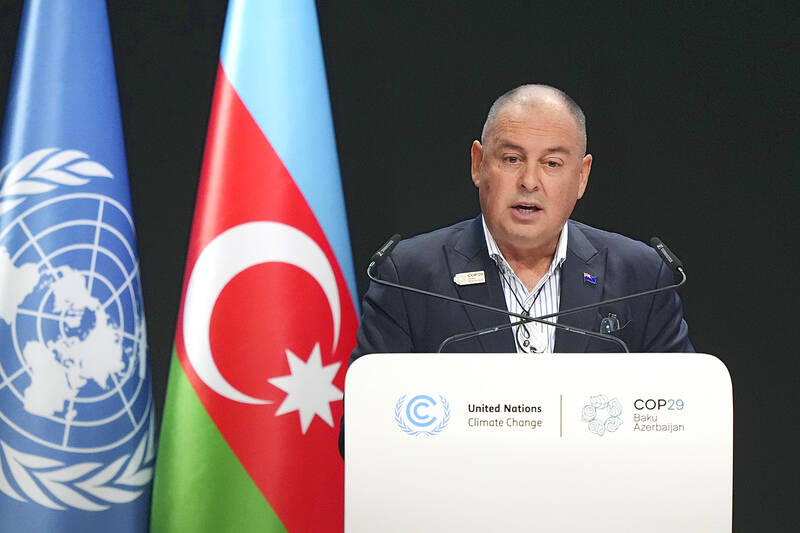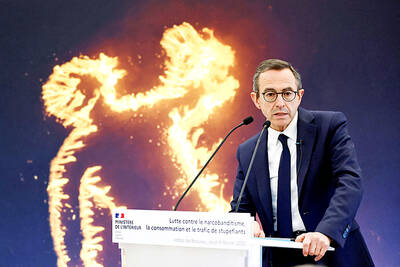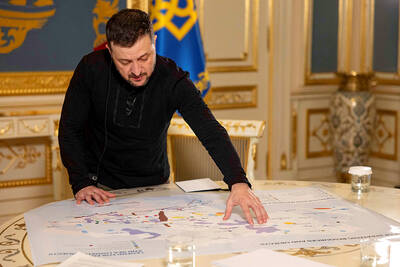Cook Islands officials yesterday said they had discussed seabed minerals research with China as the small Pacific island mulls deep-sea mining of its waters.
The self-governing country of 17,000 people — a former colony of close partner New Zealand — has licensed three companies to explore the seabed for nodules rich in metals such as nickel and cobalt, which are used in electric vehicle (EV) batteries.
Despite issuing the five-year exploration licenses in 2022, the Cook Islands government said it would not decide whether to harvest the potato-sized nodules until it has assessed environmental and other impacts.

Photo: AP
Cook Islands Prime Minister Mark Brown has nevertheless touted the benefits of the potentially multibillion-dollar industry, saying last year that the country needs to protect itself against climate change “through whatever revenues that we can get.”
Officials from the Cook Islands Seabed Minerals Authority said they had engaged in high-level talks with Chinese research institutes when they joined Brown on a five-day state visit to China this week.
Talks with Chinese researchers highlighted “collaborative opportunities” in areas including seabed minerals, the Cook Islands’ body said in a statement.
The delegation also spoke about potentially working together on marine and deep-sea exploration technology, it said.
“These conversations have opened the door to new areas of collaboration,” said Brown, who is also the minister of seabed minerals.
Brown’s China visit — during which he was expected to sign a “joint action plan” for a comprehensive strategic partnership with Beijing — has raised hackles in New Zealand.
New Zealand Minister of Foreign Affairs Winston Peters’ spokesperson complained this week of a lack of consultation over the trip, describing it as “a matter of significant concern.”
Under the two countries’ free association, Cook Islanders are citizens of New Zealand, which provides budgetary assistance and help in foreign affairs and defense.
China is vying for diplomatic, economic and military influence in the strategically important Pacific, challenging the historic regional sway of the US, New Zealand and Australia.
However, New Zealand itself is rethinking its position on deep-sea mining.
New Zealand Minister for Oceans and Fisheries Resources Shane Jones this week said his government was considering withdrawing the country’s support for an international ban on the practice.
“We can’t deny ourselves the option where critical minerals have an increasingly critical role to play,” he said.
Conservation groups and scientists fear deep-sea mining could devastate poorly understood marine systems that play a crucial role in regulating the climate.

RIGHTS FEARS: A protester said Beijing would use the embassy to catch and send Hong Kongers to China, while a lawmaker said Chinese agents had threatened Britons Hundreds of demonstrators on Saturday protested at a site earmarked for Beijing’s controversial new embassy in London over human rights and security concerns. The new embassy — if approved by the British government — would be the “biggest Chinese embassy in Europe,” one lawmaker said earlier. Protester Iona Boswell, a 40-year-old social worker, said there was “no need for a mega embassy here” and that she believed it would be used to facilitate the “harassment of dissidents.” China has for several years been trying to relocate its embassy, currently in the British capital’s upmarket Marylebone district, to the sprawling historic site in the

A deluge of disinformation about a virus called hMPV is stoking anti-China sentiment across Asia and spurring unfounded concerns of renewed lockdowns, despite experts dismissing comparisons with the COVID-19 pandemic five years ago. Agence France-Presse’s fact-checkers have debunked a slew of social media posts about the usually non-fatal respiratory disease human metapneumovirus after cases rose in China. Many of these posts claimed that people were dying and that a national emergency had been declared. Garnering tens of thousands of views, some posts recycled old footage from China’s draconian lockdowns during the COVID-19 pandemic, which originated in the country in late

French police on Monday arrested a man in his 20s on suspicion of murder after an 11-year-old girl was found dead in a wood south of Paris over the weekend in a killing that sparked shock and a massive search for clues. The girl, named as Louise, was found stabbed to death in the Essonne region south of Paris in the night of Friday to Saturday, police said. She had been missing since leaving school on Friday afternoon and was found just a few hundred meters from her school. A police source, who asked not to be named, said that she had been

BACK TO BATTLE: North Korean soldiers have returned to the front lines in Russia’s Kursk region after earlier reports that Moscow had withdrawn them following heavy losses Ukrainian President Volodymyr Zelenskiy on Friday pored over a once-classified map of vast deposits of rare earths and other critical minerals as part of a push to appeal to US President Donald Trump’s penchant for a deal. The US president, whose administration is pressing for a rapid end to Ukraine’s war with Russia, on Monday said he wanted Ukraine to supply the US with rare earths and other minerals in return for financially supporting its war effort. “If we are talking about a deal, then let’s do a deal, we are only for it,” Zelenskiy said, emphasizing Ukraine’s need for security guarantees